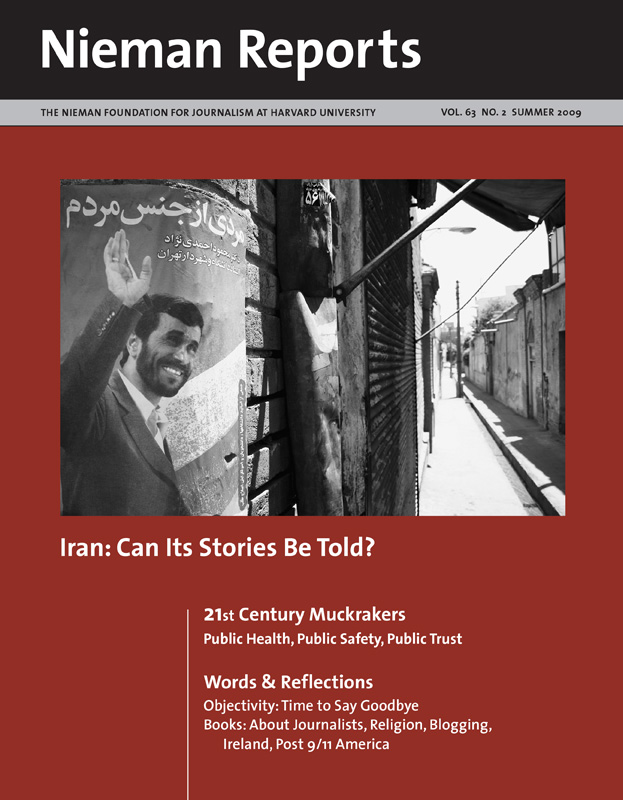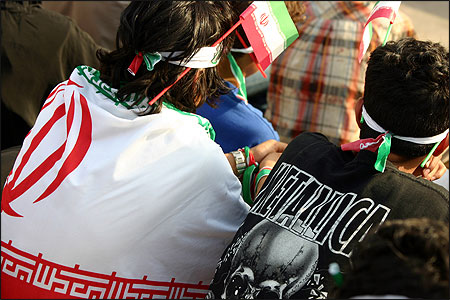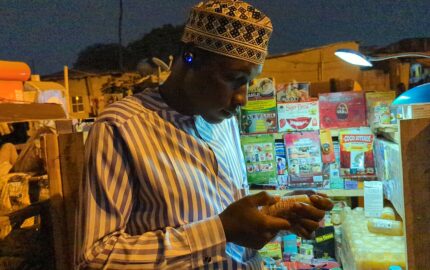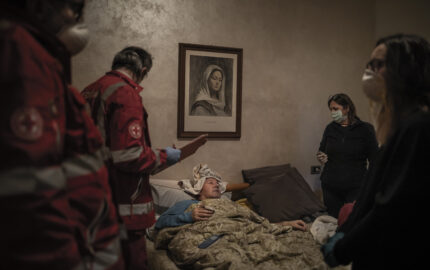

Wearing an Iranian flag, a Metallica T-shirt, and bandannas supporting reformist candidate Mostafa Moein, two friends attended a 2005 pre-election rally in a Tehran soccer stadium. Photo by Iason Athanasiadis.
On a spring afternoon, Iason Athanasiadis, then in his Nieman year and a photojournalist who’d worked in Tehran for three years before arriving in Cambridge, urged me to have Nieman Reports illuminate the ways in which Iranian and Western journalists and those who carry dual citizenship work in Iran. His vision was of a wide-ranging exploration of on-the-ground reporting. A year later, stories woven with threads of reporting experiences remind us of why it’s difficult for outsiders to truly understand what is happening in Iran.
Roya Hakakian grew up in postrevolutionary Iran. Now, as an Iranian-American author and journalist, she yearns for a clearer view of her homeland to emerge. “Poor reporting from and about Iran has kept the West in the dark,” she writes. “In this lightlessness, Iranians are rendered as ghosts.”
Journalists still push against boundaries of what Iran permits to tell what is happening there. Doing so invites the tactics of intimidation, threats and interrogations and the risk of imprisonment, banishment, torture and, in some cases, death. A reporter who has been imprisoned and is writing without a byline says: “It is undecided life, with the risks taken being unpredictable, since its press law is open to interpretation. Punishment for breaking the law depends on many things, too, including who you are and what your job is.” Another reporter sent us an e-mail to explain why words intended for our pages would not be on them: “If it was a better time, I would have done it. I am under a lot of psychological pressure, and I am trying not to let it affect my work. My neighbors keep getting calls from security officials who tell them that I am involved in drug smuggling. I am assuming that they want to intimidate me with embarrassing charges before the election.”
Others in our Nieman family provided invaluable guidance, and I am grateful to them. Roza Eftekhari, once an editor at Zanan, a women’s magazine in Iran banned in 2007 by the Press Supervisory Board, reached out to Iranian journalists and asked them to write for this issue. She also found a Farsi translator, Semira Noelani Nikou, a 22-year-old student at Scripps College. Hannah Allam, Scheherezade Faramarzi, Dorothy Parvaz, Nieman Fellows in this year’s class, generously offered advice, with Scheherezade and Parvaz, both with family ties to Iran, joining their words to our pages, giving a gift to us all.


